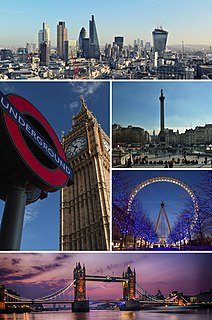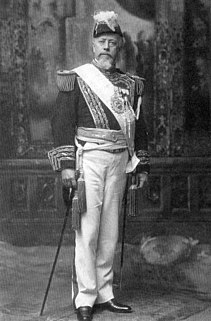
Alejo Julio Argentino Roca Paz was an army general who served as 8th President of Argentina from 12 October 1880 to 12 October 1886 and 13th from 12 October 1898 to 12 October 1904. Roca is the most important representatives of the Generation of '80 and is known for directing the "Conquest of the Desert", a series of military campaigns against the indigenous peoples of Patagonia. During his two terms as president, many important changes occurred, particularly major infrastructure projects of railroads and port facilities; increased foreign investment, particularly from Great Britain; large-scale immigration from southern Europe; expansion of the agricultural and pastoral sectors of the economy; and laicizing legislation strengthening state power. Roca's main foreign policy concern was to set the limits with Chile, which had never been determined with precision. Roca took advantage of the fact that year of 1881, Chile was fighting the War of the Pacific against Bolivia and Peru, so for Chile it was strategically important not to have a second military front. Argentina gained territory by treaty with Chile.

The Revolution of the Park, also known as the Revolution of '90, was an uprising against the national government of Argentina that took place on July 26, 1890 and started with the takeover of the Buenos Aires Artillery Park. It was led by members of the Civic Union against the presidency of Miguel Juárez Celman. Though it failed in its main goals, the revolution forced Juárez Celman's resignation and marked the decline of the elite of the Generation of '80.

The Civic Union of the Youth was a youth-oriented Argentine political party founded on September 1, 1889 and dissolved on April 13, 1890 with the establishment of the Civic Union. Soon afterward its leaders originated the most important Argentine political parties of the early 20th Century: the Radical Civic Union, the National Civic Union, the Socialist Party, and the Democratic Progressive Party.
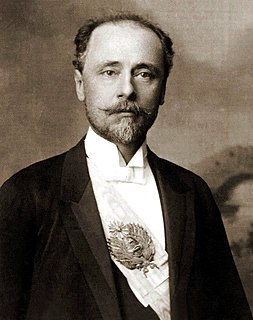
Miguel Angel Juárez Celman was President of Argentina from 12 October 1886 to 6 August 1890. A lawyer and politician, his career was defined by the influence of his kinsman, Julio Argentino Roca, who propelled him into a legislative career. He was a staunch promoter of separation of church and state and an aristocratic liberal.

Dardo Rocha was an Argentine naval officer, lawyer and politician best known as the founder of the city of La Plata and of the University of La Plata.
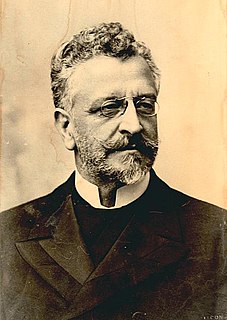
Amancio Alcorta was an Argentine legal theorist, conservative politician and diplomat.
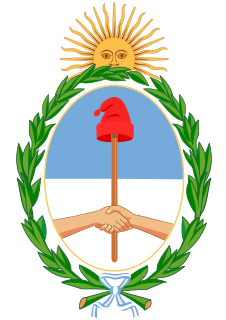
Argentina held nine presidential elections between 1862 and 1910, every six years.

Norberto Camilo Quirno Costa was an Argentine lawyer, politician, and diplomat.

Eduardo Wilde was an Argentine physician, politician, and writer, and among the most prominent intellectual figures of the modernizing Generation of '80 in Argentina.
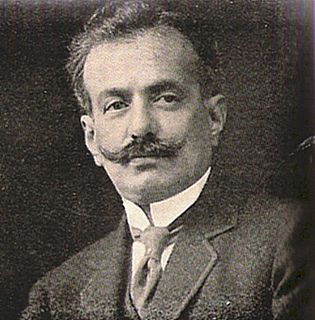
Ramón José Cárcano was an Argentine lawyer, historian and politician who served as Governor of Córdoba from 1913 to 1916, and from 1925 to 1928.

Estanislao Severo Zeballos was an Argentine lawyer and politician who was Minister of Foreign Affairs of his country three times. He was one of the most prominent intellectuals and politicians of his time. He wrote on a broad range of subjects in books and periodicals, including Catholicism, history, ethnography and geography.
Events in the year 1886 in Argentina.
The Argentine presidential election of 1860 was held on 6 February to choose the second president of the Argentine Confederation. Santiago Derqui was elected president.
The Argentine presidential election of 1874 was held on 12 April to choose the president of Argentina. Nicolás Avellaneda was elected president.
The Argentine presidential election of 1880 was held on 12 April to choose the president of Argentina. Julio Argentino Roca was elected president.
The Argentine presidential election of 1892 was held on 10 April to choose the president of Argentina. Luis Sáenz Peña was elected president.
The Argentine presidential election of 1904 was held on 12 June to choose the president of Argentina. Manuel Quintana was elected president.
The Argentine presidential election of 1910 was held on 13 March to choose the president of Argentina. Roque Sáenz Peña was elected president.
The Argentine presidential election of 1898 was held on 10 April to choose the president of Argentina. Julio Argentino Roca was elected president for a second period.





